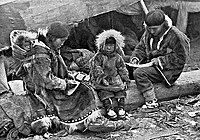
Photo from wikipedia
Adverse childhood experiences (ACEs) can negatively affect social-emotional functioning. The association between individual and cumulative ACEs and social-emotional domains of self-esteem, loneliness, and negotiation in intimate partner relationships has not… Click to show full abstract
Adverse childhood experiences (ACEs) can negatively affect social-emotional functioning. The association between individual and cumulative ACEs and social-emotional domains of self-esteem, loneliness, and negotiation in intimate partner relationships has not been explored in low-risk emerging adults, a gap this study aims to fill. An online survey was administered to undergraduate emerging adults, ages 18 to 25 years (Mage = 19.73, SD = 1.83; N = 436; 20.60% Hispanic; 63.80% female). The ACEs Survey, Child Abuse Potential Inventory, and Conflict Tactics Scale-2nd Edition were used. Three multivariate ordinary least squares regressions were run, each including predictors significant in bivariate analyses and outcomes of self-esteem, loneliness, and negotiation for each regression. Emotional abuse, B = -.20, p < .01; emotional neglect, B = -.21, p < .001; and substance using family member, B = -.12, p < .05, were negatively associated with self-esteem; emotional neglect, B = .11, p < .01, and cumulative ACEs, B = .16, p < .01, were positively associated with loneliness; and incarcerated family member was positively associated with negotiation, B = .12, p < .05. Overall, these findings suggest that individual ACEs associated with environmental instability (e.g., emotional abuse) are strong predictors of social-emotional outcomes, relative to ACEs associated with more direct physical harm (e.g., sexual abuse).
Journal Title: Journal of interpersonal violence
Year Published: 2020
Link to full text (if available)
Share on Social Media: Sign Up to like & get
recommendations!